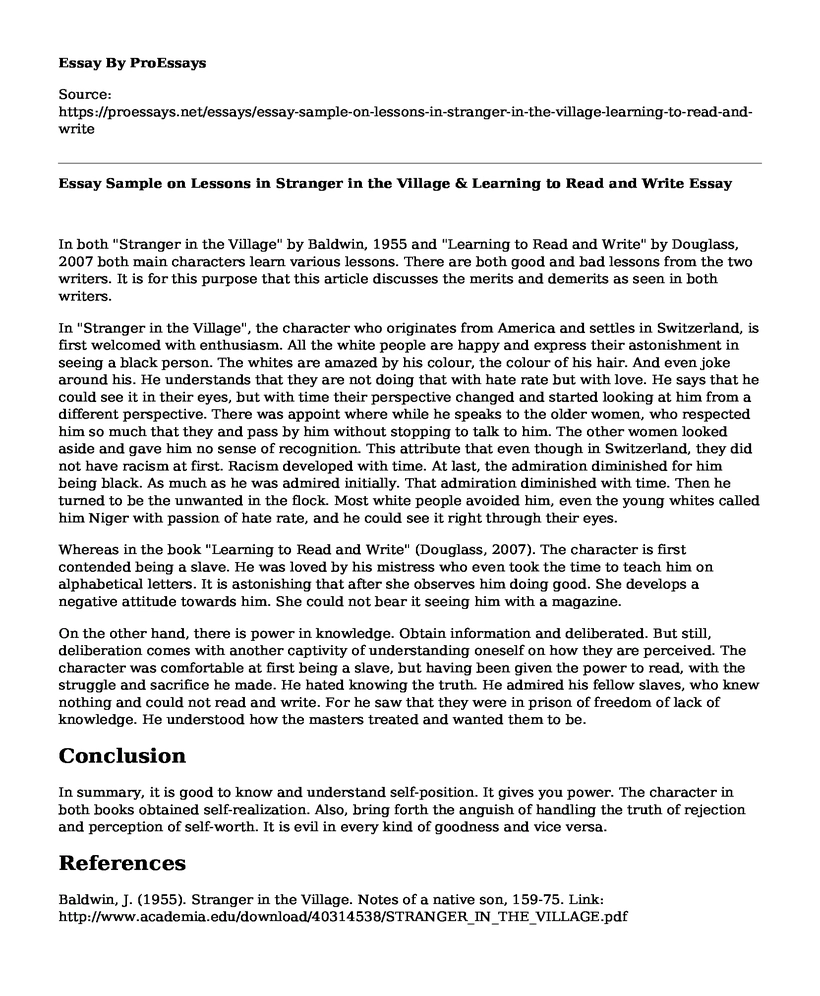In both "Stranger in the Village" by Baldwin, 1955 and "Learning to Read and Write" by Douglass, 2007 both main characters learn various lessons. There are both good and bad lessons from the two writers. It is for this purpose that this article discusses the merits and demerits as seen in both writers.
In "Stranger in the Village", the character who originates from America and settles in Switzerland, is first welcomed with enthusiasm. All the white people are happy and express their astonishment in seeing a black person. The whites are amazed by his colour, the colour of his hair. And even joke around his. He understands that they are not doing that with hate rate but with love. He says that he could see it in their eyes, but with time their perspective changed and started looking at him from a different perspective. There was appoint where while he speaks to the older women, who respected him so much that they and pass by him without stopping to talk to him. The other women looked aside and gave him no sense of recognition. This attribute that even though in Switzerland, they did not have racism at first. Racism developed with time. At last, the admiration diminished for him being black. As much as he was admired initially. That admiration diminished with time. Then he turned to be the unwanted in the flock. Most white people avoided him, even the young whites called him Niger with passion of hate rate, and he could see it right through their eyes.
Whereas in the book "Learning to Read and Write" (Douglass, 2007). The character is first contended being a slave. He was loved by his mistress who even took the time to teach him on alphabetical letters. It is astonishing that after she observes him doing good. She develops a negative attitude towards him. She could not bear it seeing him with a magazine.
On the other hand, there is power in knowledge. Obtain information and deliberated. But still, deliberation comes with another captivity of understanding oneself on how they are perceived. The character was comfortable at first being a slave, but having been given the power to read, with the struggle and sacrifice he made. He hated knowing the truth. He admired his fellow slaves, who knew nothing and could not read and write. For he saw that they were in prison of freedom of lack of knowledge. He understood how the masters treated and wanted them to be.
Conclusion
In summary, it is good to know and understand self-position. It gives you power. The character in both books obtained self-realization. Also, bring forth the anguish of handling the truth of rejection and perception of self-worth. It is evil in every kind of goodness and vice versa.
References
Baldwin, J. (1955). Stranger in the Village. Notes of a native son, 159-75. Link: http://www.academia.edu/download/40314538/STRANGER_IN_THE_VILLAGE.pdf
Douglass, F. (2007). Learning to read and write. 50 Essays, A Portable Anthology, 2004-100. Link: http://vonsteuben.enschool.org/ourpages/auto/2013/10/31/42380201/douglass%20learning%20to%20read%20and%20write.pdf
Cite this page
Essay Sample on Lessons in Stranger in the Village & Learning to Read and Write. (2023, Feb 06). Retrieved from https://proessays.net/essays/essay-sample-on-lessons-in-stranger-in-the-village-learning-to-read-and-write
If you are the original author of this essay and no longer wish to have it published on the ProEssays website, please click below to request its removal:
- 12 Angry Men: Film Analysis Essay
- Martin Scorsese's Silence - Movie Analysis Essay
- Paper Example on Evaluating Performance of Email Platform: Excel Spreadsheet Timeline
- Essay Example on One Tweet, One Life: Jon Ronson and Justine Sacco's Story
- Essay Example on Humor: Transgression of Taboos & Surprising Deviations
- Essay Example on American Music: A Reflection of Cultural Diversity & Global Influence
- Fences: A Traditionally Constructed but Touching Drama - Essay Sample







